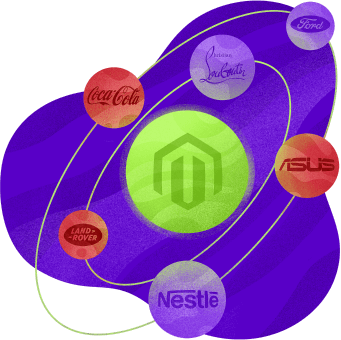Magento is used by popular brands such as Nestlé, Coca-Cola, Land Rover, and Christian Louboutin,
to name a few, to power their online stores. It is one of the most popular ecommerce platforms
in the world today, with a user base that reaches across businesses of all sizes, operating in a
variety of industries.The list of blue-chip companies using Magento is extensive, and many
well-known brands are increasingly re-platforming to Magento thanks to its high customizability
and scalability.
Here are some of Magento’s customers.
Aldo
The Aldo Group Inc., a well-known global brand retailing trendy footwear and accessories,
switched to Magento for its ability to handle complicated promotions. Their mid-range fashion
products have a large customer base in South East Asia. With over 80 retail stores across
Indonesia, Thailand, Singapore, and Malaysia, Aldo wanted to reward their loyal customer base
through an A-list loyalty program. Their primary goal was to deliver discounts and exclusive
offers to their customers through a tiered online and in-store program. At the same time, they
wanted to expand ecommerce across South East Asia while careering to their audience’s
local preferences. To achieve this, they decided to opt for Magento Commerce
Cloud thanks to its flexibility in managing complex promotions across multiple websites
and integrating with existing and future systems. Aldo launched their Magento stores in less
than two months and saw near-instant results with their sales doubling and a 15% reduction in
their total cost of ownership.
AsusTek
AsusTek Computer Inc., a well-known brand in the gaming and consumer notebook industry, switched
to Magento for its website in Singapore, aiming to boost its regional business heavily reliant
on its retail store-based reseller network. While their existing website was a great source of
information, it lacked online ordering functionality. They also wanted to streamline their
tracking of product purchases and their distribution process while strengthening their brand
presence across the customer journey, all through a common platform. They chose Magento Commerce for its
strong B2B and B2C capabilities possible using a single backend website. The flexibility it
offered through customizations allowed them to streamline their back-office processes by
integrating with ASUS’s centralized systems. Since launching on Magento in June 2019, ASUS
experienced a 56% growth in mobile and PC revenue, which was backed by a 59% increase in mobile
and PC transactions as compared to the previous year.
Monash University
Monash University, one of Australia’s leading universities, decided to move to Magento
after struggling with a fragmented ecommerce landscape made of inconsistent web pages, POS
systems, and ecommerce platforms. The entire customer experience on their old website
wasn’t in line with Monash University’s high standards. They wanted to unify their
online operations under a single platform that could handle it all. Monash University also had a
diverse range of products ranging from merchandise, books, and sports gear to seminars and
tickets. They wanted their students to be able to purchase all their offerings from a single
platform. After moving to Magento, Monash University’s online catalog saw a 240% increase
in the number of SKUs thanks to its ease of use. Within only two years of switching to Magento,
they also saw a massive $17 million increase in their online sales. At the time, Monash
University’s adoption of Magento was a global first for an ecommerce institution.
Rubik’s Cube
One of the most popular puzzle games globally, the Rubik’s Cube, is also among companies
using Magento to run their ecommerce store. Before switching to Magento, Rubik’s used a
website built on ExpressionEngine but found their
online store’s backend to be overly complicated and inflexible. They wanted to expand
their direct-to-consumer business while expanding into new countries and wanted a scalable and
flexible platform to support their growing business. Speed was essential to Rubik’s, and
after moving to Magento, they were able to achieve page load times of under one second. They
could go global and easily spin up international websites and landing pages tailored to local
languages and currencies. Switching to Magento helped them increase their average order values
from £12.00 ($16) to £17.00 ($23) while doubling their conversion rate at the same
time. Their bounce rate dropped by an average of 20%, and their revenue in the United Kingdom
alone went up by 150% in the first six months.
Magento is a platform built for performance, customizability, and scalability. It’s capable
of supporting both a mom-and-pop shop down the road and a global enterprise with an eight-figure
turnover. It provides companies with a foundation capable of supporting their ambitions no
matter the industry they’re in or the functionality they desire.

